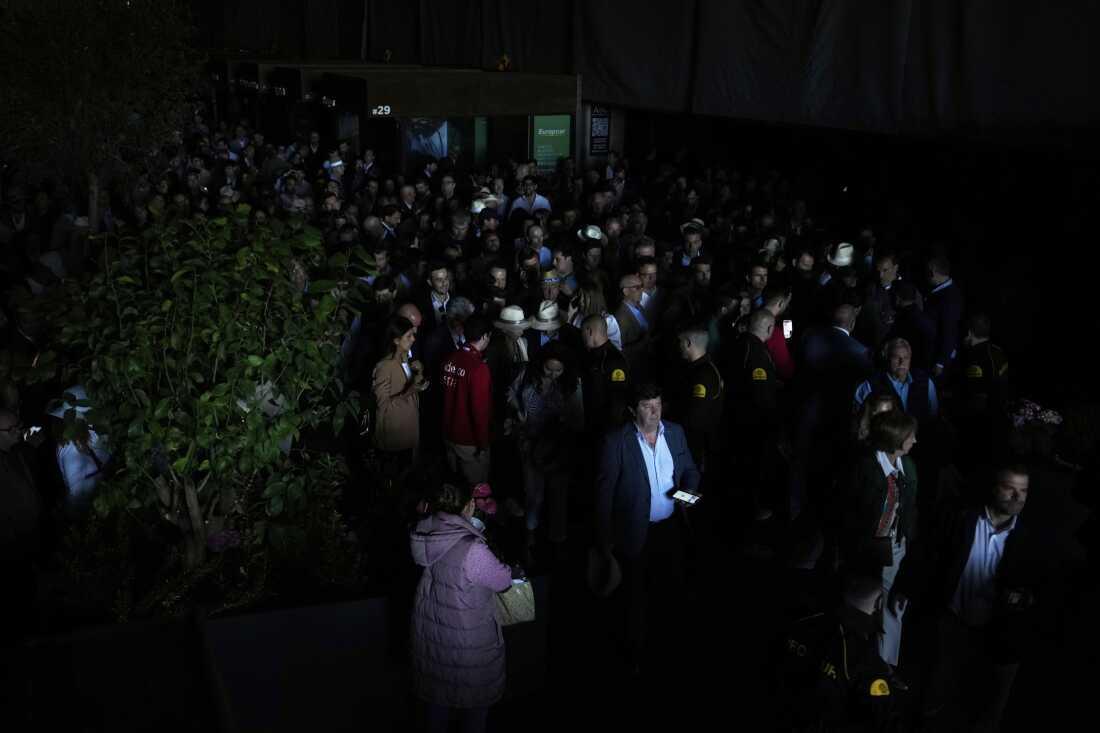Student Village Academy › Forums › GENERAL DISCUSSIONS › Massive Blackout Paralyzes Spain and Portugal, Cause Under Investigation
- This topic has 0 replies, 1 voice, and was last updated 10 months ago by
 Ayodeji adebayo.
Ayodeji adebayo.
-
AuthorPosts
-
-
April 30, 2025 at 9:53 AM #78837
 Ayodeji adebayoParticipant
Ayodeji adebayoParticipantA catastrophic power outage struck Spain and Portugal on Monday, April 28, 2025, plunging tens of millions into darkness and disrupting daily life across the Iberian Peninsula. The blackout, described as the worst in Europe in nearly two decades, caused widespread chaos, halting public transportation, grounding flights, and forcing hospitals and businesses to rely on backup generators. Minor outages were also reported in southwestern France and Andorra, though power was swiftly restored in those areas. As of Tuesday, April 29, authorities had restored nearly all power, but the cause of the outage remains under investigation, with large oscillations in the power grid cited as a key factor.

The blackout began around 12:33 CEST (10:33 UTC) on Monday, when Spain’s electricity demand plummeted from 27,500 megawatts to 15,000 megawatts in mere minutes, equivalent to a loss of 60% of the country’s power demand. Spanish Prime Minister Pedro Sánchez called the event unprecedented, noting that 15 gigawatts of power were lost in just five seconds. The sudden drop triggered a “very strong oscillation” in the electrical network, causing Spain’s grid to disconnect from the European synchronous electricity grid and collapsing the Iberian system. Portugal, heavily reliant on Spain for morning electricity imports, was caught in a “domino effect,” exacerbating the outage across the peninsula.
The impact was immediate and far-reaching. In major cities like Madrid, Barcelona, Lisbon, and Seville, traffic lights went dark, leading to gridlock and accidents. Public transportation ground to a halt, with metro systems in Madrid, Barcelona, and Lisbon evacuated, leaving passengers to navigate pitch-black tunnels using phone flashlights. Spain’s national railway operator, Renfe, suspended all train services, stranding 116 trains and prompting rescue operations for passengers. Airports in Madrid, Barcelona, and Lisbon faced severe disruptions, with 20% of flights canceled and terminals operating on backup systems. The Madrid Open tennis tournament was forced to suspend play when scoreboards and electronic line-calling systems failed.
Telecommunications were also heavily affected, with mobile networks and internet access cut off in many areas. Businesses, unable to process electronic payments, closed or resorted to cash-only transactions, while ATMs remained inoperable. Supermarkets saw panic buying, and small businesses, such as ice cream shops, reported significant losses due to spoilage. Hospitals, while equipped with generators, postponed non-emergency procedures and faced challenges with water supply in some facilities. Tragically, at least seven deaths were reported in Spain, including three in Galicia from carbon monoxide poisoning linked to generator use.
The outage briefly spilled over to southwestern France, affecting households in the Basque region, and caused seconds-long disruptions in Andorra. France’s grid operator, RTE, quickly restored power and offered to export electricity to Spain once the Iberian grid stabilized. Morocco also supplied power to southern Spain, aiding recovery efforts.
By Tuesday morning, Spain’s grid operator, Red Eléctrica (REE), reported that 99% of the country’s power capacity had been restored, with full restoration achieved by 11:00 CEST. In Portugal, the grid operator Redes Energéticas Nacionais (REN) confirmed that all substations were operational, restoring power to 2.5 million customers. However, transportation disruptions lingered, with Spain’s Transport Minister Óscar Puente warning that medium- and long-distance train services might not resume until Wednesday.
The cause of the blackout remains elusive, though authorities have identified large oscillations in the power grid as the trigger. REE reported two incidents of power generation loss, likely from solar plants in southwestern Spain, which caused instability and led to the disconnection from France’s grid. João Conceição of REN suggested a “very large oscillation in electrical voltage” originating in Spain’s system, but emphasized that the exact cause was still under investigation. Initial reports attributed the outage to a “rare atmospheric phenomenon” or extreme temperature variations, but REN later denied these claims.
While Spanish and Portuguese officials, including Prime Minister Sánchez and European Council President António Costa, ruled out a cyberattack based on preliminary assessments, Spain’s High Court and cybersecurity authorities launched investigations to explore the possibility. Prime Minister Sánchez stressed that “no cause can be discredited,” and Portugal’s Luís Montenegro requested an independent audit by the EU’s Agency for the Cooperation of Energy Regulators. The European Commission, through Energy Commissioner Dan Jorgensen, pledged a “thorough investigation” into the outage, described as the most severe in Europe in nearly two decades.
The blackout has sparked debate about the reliability of Spain’s energy system, which relies on solar and wind for 43% of its electricity, well above the global average. At the time of the outage, solar power accounted for 59% of Spain’s electricity, but generation dropped by more than 50% in five minutes. Some experts, like energy analyst Carlos Cagigal, suggested that the absence of nuclear power, which was offline during the outage, left the grid vulnerable to fluctuations from renewable sources. However, Sánchez dismissed claims that excess renewable energy caused the blackout, noting that demand was low and supply was ample.
The outage exposed vulnerabilities in the Iberian Peninsula’s highly integrated energy grid, which operates as an “energy island” with limited interconnections to the rest of Europe. Experts like Georg Zachmann from the Bruegel think tank highlighted the need for advanced grid management tools, such as flywheels or power electronics, to handle the intermittency of renewables. Previous European outages, such as those in 2003 and 2006, underscore the risks of interconnected grids spreading failures across borders.
Both governments declared states of emergency, with Spain deploying 30,000 police and the Civil Guard to manage traffic and assist stranded citizens. Emergency services were overwhelmed, with Madrid’s 112 line receiving nearly 5,000 calls and Catalonia logging 14,000. Portugal declared an energy crisis, urging citizens to conserve water to prevent system failures.
As recovery efforts continue, the focus has shifted to preventing future outages. Sánchez vowed to implement “all necessary measures” to strengthen the grid, while Montenegro emphasized the need for an EU-led audit. The incident has prompted calls for a reevaluation of energy policies, particularly Spain’s plan to phase out nuclear power by 2025. For now, the Iberian Peninsula is back online, but the scars of this unprecedented blackout linger, with businesses counting losses and citizens demanding answers.
-
-
AuthorPosts
- You must be logged in to reply to this topic.

